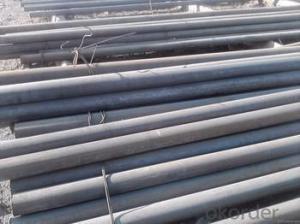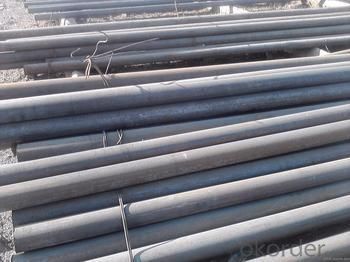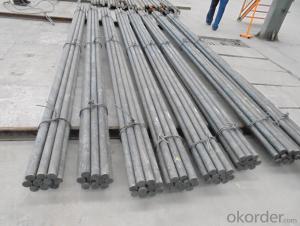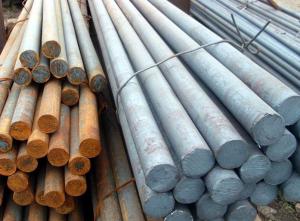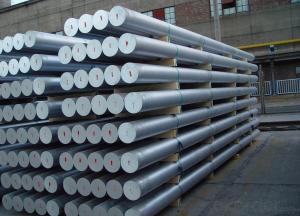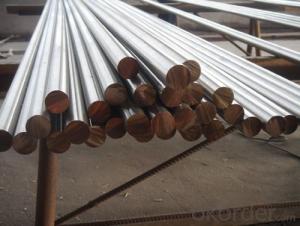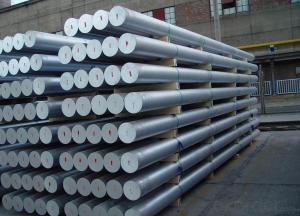Q235 size 5mm to 100mm steel round bar for construction
- Loading Port:
- Tianjin
- Payment Terms:
- TT or LC
- Min Order Qty:
- 25 m.t.
- Supply Capability:
- 100000 m.t./month
OKorder Service Pledge
OKorder Financial Service
You Might Also Like
Product Description:
OKorder is offering Q235 size 5mm to 100mm steel round bar for construction at great prices with worldwide shipping. Our supplier is a world-class manufacturer of steel, with our products utilized the world over. OKorder annually supplies products to European, North American and Asian markets. We provide quotations within 24 hours of receiving an inquiry and guarantee competitive prices.
Product Applications:
Q235 size 5mm to 100mm steel round bar are ideal for structural applications and are widely used in the construction of buildings and bridges, and the manufacturing, petrochemical, and transportation industries.
Product Advantages:
OKorder's steel round bar are durable, strong, and resist corrosion.
Main Product Features:
· Premium quality
· Prompt delivery & seaworthy packing (30 days after receiving deposit)
· Corrosion resistance
· Can be recycled and reused
· Mill test certification
· Professional Service
· Competitive pricing
Product Specifications:
1. Grade: 304, 316L, 321
2. Type: Mild carbon steel
3. Shape: Round bar, solid bar of steel with circular section
4. Diameter: 8mm-150mm
5. HS Code: 72283010
Usage and Applications of Common Steel Round Bar
1. Common Steel Round Bar of 8-25mm, or small round is mostly used for straight bundles supply, and used for steel, bolts and various mechanical parts. While the bigger round bar, or more than 25mm hot rolled bar, is mainly for the manufacture of mechanical parts or for seamless steel billet.
2. Steel round bar is used in construction and a large number of architectural and engineering structures.
3. Besides, we can supply some especial material steel round bar that can be used for main shaft of steamer, hummer shank, with big section and supper force.
Packaging & Delivery of Common Steel Round Bar
Packaging Detail: All goods are packed in bundle with steel strips and shipped by break bulk vessel or container (depend on target market and different ports)
Delivery Detail: 45 days
Trade terms: FOB, CFR, CIF
MOQ: 25 tons per specification; we can negotiate the quantity if the specification is normal or we have stock of one specification.
Weight: The price invoicing on theoretical weight basis or actual weight basis depends on customer’s request.
Shipment: The shipment of bulk break or container is depends on customer’s request and the situation of the port of destination.
Documents given: Full set of original clean on board bill of lading; Original signed commercial invoice; Original packing list; Policy of insurance; Certificate of origin and what the target market needs.
Production Flow of Common Steel Round Bar
We use advanced equipments like Electric Arc Furnace, Ladle Furnace and Vacuum Degasser to produce our products.
Material prepare (billet) — heat up — rough rolling — precision rolling — cooling — packing — storage and transportation
FAQ:
Q1: Why buy Materials & Equipment from OKorder.com?
A1: All products offered byOKorder.com are carefully selected from China's most reliable manufacturing enterprises. Through its ISO certifications, OKorder.com adheres to the highest standards and a commitment to supply chain safety and customer satisfaction.
Q5: Can stainless steel rust?
A5: Stainless does not "rust" as you think of regular steel rusting with a red oxide on the surface that flakes off. If you see red rust it is probably due to some iron particles that have contaminated the surface of the stainless steel and it is these iron particles that are rusting. Look at the source of the rusting and see if you can remove it from the surface.
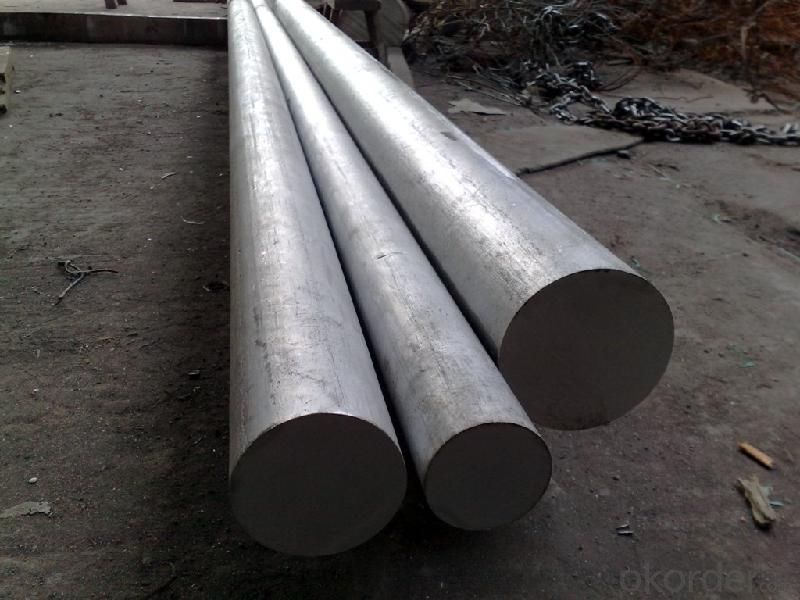
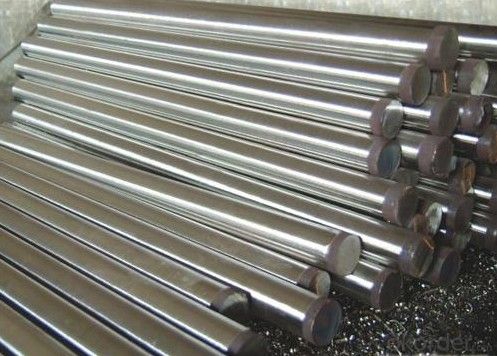
Characteristics of Common Steel Round Bar
1. The steel in which the main interstitial alloying constituent is carbon in the range of 0.12–2.0%.
2. As the carbon percentage content rises, steel has the ability to become harder and stronger through heat treating; however it becomes less ductile.
3. Quality should be in conformity with the specification of the manufacturer. Quantity and packing conditions should be in conformity with the term in the contract.
4. Regardless of the heat treatment, higher carbon content reduces weld ability. In carbon steels, the higher carbon content lowers the melting point.
- Q: What is the cost of steel round bars?
- The cost of steel round bars can vary depending on factors such as the size, grade, and market conditions. It is recommended to contact suppliers or check online catalogs for the most accurate and up-to-date pricing information.
- Q: What is the tolerance level for steel round bars?
- The tolerance level for steel round bars can vary depending on several factors such as the grade and diameter of the bar, as well as the specific industry standards and requirements. Generally, the tolerance level for steel round bars is specified in terms of diameter or diameter deviation. For example, in the manufacturing industry, the tolerance level for steel round bars can be specified as a specific diameter range, such as +/- 0.001 inches or +/- 0.02 millimeters. This means that the actual diameter of the bar should be within this specified range to meet the tolerance requirements. Additionally, the tolerance level can also be specified in terms of diameter deviation, which refers to the difference between the actual diameter of the bar and the specified nominal diameter. This deviation is usually expressed as a percentage or a specific measurement, such as +/- 0.5% or +/- 0.010 inches. It is important to note that the tolerance level for steel round bars can be more stringent in certain industries, such as aerospace or automotive, where precision and quality are critical. In these cases, the tolerance requirements may be narrower to ensure the bar meets the specific performance and safety standards. Ultimately, it is essential to consult the relevant industry standards, specifications, or customer requirements to determine the specific tolerance level for steel round bars in a particular application.
- Q: Can steel round bars be used in the manufacturing of tools and equipment?
- Yes, steel round bars can be used in the manufacturing of tools and equipment. Steel is a popular material choice for tool and equipment manufacturing due to its excellent strength, durability, and versatility. Steel round bars can be easily shaped, cut, and formed into various tool components such as shafts, handles, and blades. Additionally, steel's high tensile strength and resistance to wear and tear make it suitable for heavy-duty applications. It can withstand the forces and stress involved in tool usage, ensuring a long lifespan and reliable performance. Furthermore, steel's ability to be heat-treated and hardened allows for the creation of tools with enhanced hardness and toughness, making them more effective in cutting, shaping, or gripping tasks. Overall, steel round bars are a popular and widely used material in the manufacturing of tools and equipment due to their strength, durability, and versatility.
- Q: Excuse me and steel disc round what is the difference?
- Main application: Pu wire is mainly used for building reinforced concrete structure for reinforcing bars, and it can also be made of cold drawn steel wire for strapping and so on.
- Q: Are steel round bars magnetic?
- Indeed, steel round bars have the potential to possess magnetic characteristics. The magnetism of steel is contingent on its composition and processing methods. The predominant steel alloys utilized, such as carbon steel or stainless steel, prominently feature iron as their primary constituent. Iron is recognized as a ferromagnetic substance, signifying its susceptibility to magnetization. Thus, steel round bars constructed from these alloys will inevitably display magnetic attributes. However, it is crucial to acknowledge that the strength of the magnetism can fluctuate depending on the precise composition of the steel. Certain stainless steel alloys, for instance, possess a lower magnetic permeability and may consequently manifest diminished magnetic traits in comparison to carbon steel.
- Q: Can steel round bars be heat treated?
- Yes, it is possible to heat treat steel round bars. Heat treatment involves controlled heating and cooling of the steel to alter its physical and mechanical properties. Various heat treatment processes can be used on steel round bars, including annealing, normalizing, quenching, and tempering. Annealing is a heat treatment method where the steel is heated to a specific temperature and held there for a certain period of time. It is then slowly cooled. This process is used to soften the steel, improve its machinability, and reduce internal stresses. Normalizing is similar to annealing, but the cooling is done in air. It is often employed to refine the grain structure of the steel and enhance its overall strength and toughness. Quenching is a rapid cooling process where the steel round bars are immersed in a quenching medium, such as oil or water, to cool them quickly. This process increases the hardness and strength of the steel. However, it also makes the steel more brittle. Therefore, it is often followed by tempering to reduce brittleness and improve toughness. Tempering involves reheating the hardened steel to a specific temperature and holding it there for a certain period of time. It is then slowly cooled. This process helps to reduce the hardness and brittleness caused by quenching, while still maintaining a desirable level of strength and toughness. In summary, heat treatment is a versatile process that can be applied to steel round bars to achieve a wide range of desired properties, such as hardness, strength, toughness, and machinability.
- Q: What are the different types of steel round bar alloys for improved corrosion resistance?
- There are several types of steel round bar alloys that are known for their improved corrosion resistance. Some of the commonly used alloys include stainless steel, weathering steel, and duplex stainless steel. 1. Stainless Steel: This alloy contains a minimum of 10.5% chromium, which forms a thin, protective layer of chromium oxide on the surface of the steel. This layer acts as a barrier against corrosion, making stainless steel highly resistant to rust and other forms of corrosion. Different grades of stainless steel, such as 304 and 316, offer varying levels of corrosion resistance depending on the specific application. 2. Weathering Steel: Also known as Corten steel, weathering steel develops a protective rust-like appearance when exposed to the weather. This self-healing characteristic makes it resistant to atmospheric corrosion. The addition of copper, chromium, and nickel in weathering steel enhances its corrosion resistance and enables it to withstand harsh environmental conditions without the need for painting. 3. Duplex Stainless Steel: Duplex stainless steel is a combination of austenitic and ferritic stainless steels. This alloy offers excellent corrosion resistance due to its high chromium and molybdenum content. Duplex stainless steel is particularly resistant to localized corrosion, such as pitting and crevice corrosion, making it suitable for applications in aggressive environments like marine and chemical industries. It is important to note that the choice of steel round bar alloy for improved corrosion resistance depends on the specific application requirements and environmental conditions. Consulting with a materials engineer or corrosion specialist can help determine the most suitable alloy for a particular application.
- Q: How are steel round bars tested for quality?
- Steel round bars are tested for quality through various methods to ensure that they meet the required standards and specifications. One common test is the visual inspection, which involves examining the bars for any visible defects such as surface cracks, pits, or deformities. This is done by highly skilled personnel who are trained to identify any irregularities that may affect the quality of the steel bars. Another important test is the dimensional inspection, which measures the diameter, length, and straightness of the round bars. This ensures that the bars are within the specified tolerances and that they meet the required dimensions for their intended use. Mechanical testing is also conducted to assess the strength and mechanical properties of the steel bars. This includes tests like tensile strength, yield strength, and elongation, which determine how the bars will perform under various loads and conditions. These tests are carried out using specialized equipment and provide valuable information about the structural integrity and quality of the steel bars. Furthermore, chemical composition analysis is performed to verify that the steel bars contain the correct proportions of different elements such as carbon, manganese, and alloying elements. This analysis is crucial as it determines the suitability of the bars for specific applications and ensures that they possess the desired characteristics. In addition to these tests, non-destructive testing methods such as ultrasonic testing, magnetic particle inspection, or dye penetrant testing may also be employed. These techniques can detect internal or surface defects that may not be visible to the naked eye and provide further assurance of the quality and integrity of the steel bars. Overall, a combination of visual inspection, dimensional inspection, mechanical testing, chemical composition analysis, and non-destructive testing methods is used to thoroughly assess the quality of steel round bars. These rigorous testing processes help to ensure that the bars meet the required standards and specifications, providing customers with high-quality and reliable steel products.
- Q: What are the different shapes available for steel round bars?
- Steel round bars come in various shapes to cater to different applications. Some of the most common shapes include: 1. Round: The round shape is the most fundamental and widely used for steel round bars. It has a cylindrical form with a circular cross-section. Round bars find applications in multiple industries, including construction, automotive, and manufacturing. 2. Square: Square steel round bars possess a square cross-section. They are frequently employed in situations that demand additional strength and stability, such as support columns, fences, and ornamental ironwork. 3. Hexagonal: Hexagonal steel round bars feature six sides and a hexagonal cross-section. They provide a desirable combination of strength and versatility, making them popular for machine parts, fasteners, and tooling. 4. Flat: Flat steel round bars have a rectangular cross-section with a narrow width and thick height. They are commonly utilized in construction and manufacturing for purposes such as braces, brackets, and supports. 5. Half-round: Half-round steel round bars exhibit a semi-circular cross-section. They are commonly utilized in architectural and decorative applications like handrails, edging, and trim work. These represent some of the most prevalent shapes available for steel round bars. The choice of shape depends on the specific requirements of the application, including strength, stability, and aesthetics.
- Q: Can steel round bars be recycled?
- Yes, steel round bars can be recycled. Steel is a highly recyclable material, and the recycling process involves melting the steel bars down to be used in the production of new steel products.
Send your message to us
Q235 size 5mm to 100mm steel round bar for construction
- Loading Port:
- Tianjin
- Payment Terms:
- TT or LC
- Min Order Qty:
- 25 m.t.
- Supply Capability:
- 100000 m.t./month
OKorder Service Pledge
OKorder Financial Service
Similar products
Hot products
Hot Searches
Related keywords
